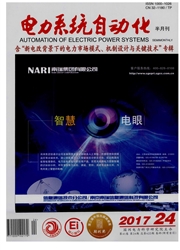

 中文摘要:
中文摘要:
针对电力系统运行过程中负荷及故障的不确定性,在经济调度中引入风险评估原理,并提出了一种全新的基于知识迁移的细菌觅食强化学习优化算法。该算法将细菌觅食算法的寻优模式与Q学习算法的试错迭代机制结合,利用多主体协同合作来更新共有的知识矩阵,并以基于知识延伸的维度缩减方式避免了"维数灾难"。在预学习获得最优知识矩阵后,利用知识迁移加速在线学习进程。IEEE RTS-79测试系统的仿真结果表明:所提算法在保证获得高质量最优解的同时,寻优速度可达经典智能算法的9~20倍,适合求解大规模复杂电网的风险调度快速优化。
 英文摘要:
英文摘要:
Referring to the load and fault uncertainty during power system operation, the risk assessment theory is introduced into economic dispatch. Moreover, a new knowledge transfer bacteria foraging optimization (TBFO) algorithm is proposed for risk based economic dispatch, which is developed by combining bacteria foraging optimization (BFO) and the try-error mechanism of Q-learning. Besides, the knowledge matrix is updated by multiple agents with cooperative collaboration, in which the knowledge extension is adopted to handle the curve of dimension. After obtaining all the optimal knowledge matrices, the convergence of the online learning can be accelerated by knowledge transfer. The performance of TBFO has been fully tested for risk based economic dispatch on the IEEE RTS-79. The simulation demonstrates that the convergence rate of TBFO can be approximately 9 to 20 times faster than that of classical intelligent algorithm, while the quality of the obtained optimal solution can be guaranteed. Hence, it is suitable for fast risk based economic dispatch of large-scale and complex power grid.
 同期刊论文项目
同期刊论文项目
 同项目期刊论文
同项目期刊论文
 期刊信息
期刊信息
